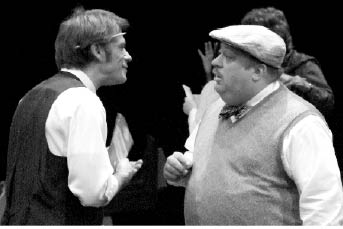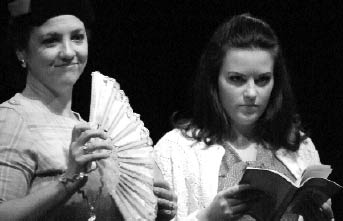A Man of No Importance
by Anthony Chase

A Man of No Importance reminds us what a powerful vehicle for expression American musicals can be, and as importantly, how the intimate stages of Buffalo’s independent professional theaters can sometimes ignite bursts of electrifying magic with plays that barely even glowed elsewhere. With a script by Terrence McNally, one of the most important American playwrights of our time; music by Stephen Flaherty and lyrics by Lynn Ahrens, the songwriting team that also created Once on this Island and Ragtime, A Man of No Importance attracted a great deal of interest when it opened off-Broadway in 2002. Though the original cast recording sounds thrilling, to be honest, the actual experience of seeing A Man of No Importance at Mitzi E. Newhouse Theater at Lincoln Center was surprisingly low-key, more cerebral than emotional, and often disappointing.
Adapted from a 1994 film of the same title, starring Albert Finney, A Man of No Importance transports us to Dublin in 1964, where we join the journey of a bus conductor named Alfie Byrne, who has a passion for the work of Oscar Wilde. Alfie is determined to produce Wilde’s controversial play, Salome, in the church Bingo hall. When the resident leading man is cast in a supporting role, he resentfully tells a powerful church committee that the play is obscene, resulting in Alfie and his amateur company being banned from the hall. Alfie’s disappointment and increasingly tense circumstances instigate his first tentative efforts to realize his homosexuality, with disastrous results.
This would seem like a lot of emotional weight to pack into a musical, and I haven’t even mentioned the pregnant but unmarried ingénue tapped to play Salome; the sister who is keeping company with Alfie’s theatrical nemesis; the bus driver with whom Alfie is infatuated who holds secrets of his own; and so on and so forth.
I have never been an admirer of the directorial work of Joe Mantello, surely one of the most overrated theater personalities in New York today. Every critique of his work seems to lament that his direction is not up to his usual standard. I am afraid that his usual standard is, in fact, quite lackluster, though occasionally his material ascends above his directorial talent. Despite a first-rate New York cast featuring Roger Rees as Alfie and Faith Prince as his sister, the original production reached isolated moments of true beauty, but not great emotional heights.
The current Irish Classical Theatre production does.
In contrast to Mantello, Brother Augustine Towey seems to benefit from his years of working in a university setting where magic must, so often, be conjured from thin air and fly on the talents of actors. His approach with A Man of No Importance is to treat each minor character like a lead, strip the setting to its minimum, keep the pace swift and allow the actors to delve headlong into the full angst and sentiment of the piece. Add to this the intimacy of the Andrews Theatre and the result is, at long last, A Man of No Importance that truly thrills.

The success of the production, of course, rests on the shoulders of the actor who plays Alfie, and Brian Riggs’ performance is a true star turn. Riggs captures the full nuance and complexity of the character with remarkable charm and authority. This is a man made of both vulnerability and flint. He is both loving and benignly manipulative. And oh yes, he sings splendidly. Audiences accustomed to seeing Riggs either in brooding dramas or in silly musicals should feel privileged to see him in a role that allows him to showcase the full range of his talent as a musical leading man to such sublime effect. He is superb.
Loraine O’Donnell and Michele Roberts as Alfie’s sister and his leading lady give similarly strong performances. O’Donnell plays Lily as a woman who seems like a rock, but who, when her brother’s secrets are revealed, is, herself, exposed as a frightened person who had been hiding behind him all along. Roberts, who possesses a beautifully pure voice, sings the role exquisitely with acting to match.
Many of the characters in the play are named after people in Oscar Wilde’s life. Alfie’s sister is named after Lily Langtry, Wilde’s friend and muse. Mrs. Patrick is named for his friend, Mrs. Patrick Campbell. Alfie’s abusive boss, Carson, is named after Edward Carson, the attorney who broke Wilde during cross-examination in his libel suit against Lord Alfred’s father. Robbie, the young bus driver, is named after Robbie Ross, Wilde’s first lover and best friend until death. In this production, even minor characters shine with the quirks and idiosyncrasies of vivid individuality. Tom Zindle gives a strong performance as Carney, the resentful amateur actor. Joseph Natale is hilarious as the clueless and inflexible Father Kenny. Chris Critelli is wonderfully appealing as the loyal bus driver, Robbie. Lisa Ludwig commands a singular and memorable appearance as mysterious Mrs. Campbell. Kerrykate Abel is a comic revelation as the amateur choreographer who envisions the Dance of the Seven Veils as a tap number, wryly suggesting her own performance in Buffalo United Artist’s comic Salome last season. Maggie Zindle, often hired for her glorious voice, gives an impressively well-measured and beautifully acted performance as egocentric Mrs. Grace, earning some of the evening’s heartiest laughs with some of its most understated jokes. Kelli Bocock-Natale tears up the stage with her numerous comic moments as earnest but untalented character actress and costume designer Miss Crowe. Diminutive but bounteously talented John Joy scores one of the production’s uncontestable highlights with his magnificent rendering of “The Cuddles Mary Gave,” a tribute to his late enormous wife.
Even pianist Nathan R. Matthews and violinist Mary Ramsey bring personality to their roles; if you doubt that a violin can act, listen for Ramsey’s contribution in the moment when Alfie is unable to confess his true dilemma to Father Kenny. Mr. Matthews’ musical direction delivers the score with great energy and brightness, especially in chorus numbers like “Going Up” and “Art,” and with haunting sentiment as in moments like “Love Who You Love.”
The production is handsomely and minimally designed by Eric Appleton, who creates an entire Dublin bus from a few chairs and the rest of the city with a few boards. Choreographer Stacy Zawadzki Janusz’s work is superior, as are Tessa Lew’s costumes.
It is a joy to see a true book musical, fully realized and beautifully performed, in which actors portray characters and probe the truths of humanity through narrative. The Irish Classical Theatre Company reveals A Man of No Importance to be a brilliantly crafted piece of theater with a powerful message and a radiantly expressive score. The production sets an exceedingly high standard for the theater season just beginning.
|
Issue Navigation> Issue Index > v5n37: Curtain Up! (9/14/06) > A Man of No Importance This Week's Issue • Artvoice Daily • Artvoice TV • Events Calendar • Classifieds |









 Current Issue
Current Issue